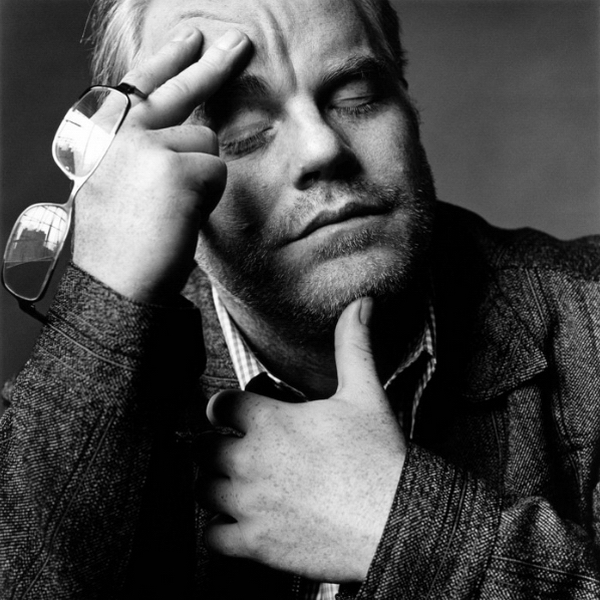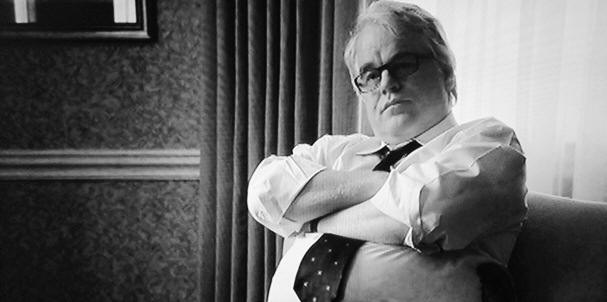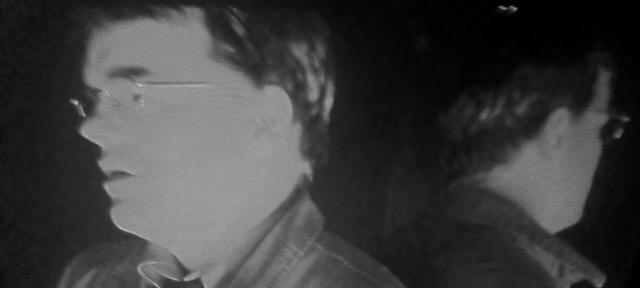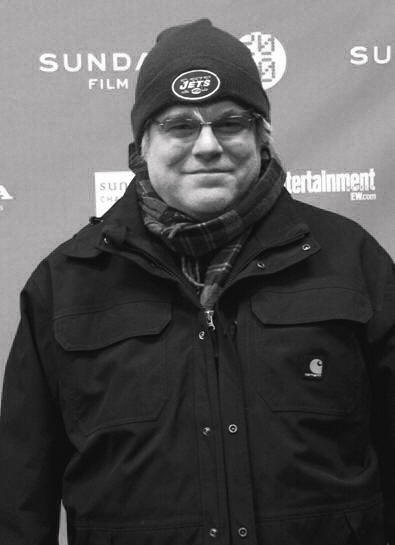MOVIE REVIEWS |
INTERVIEWS |
YOUTUBE |
NEWS
|
EDITORIALS | EVENTS |
AUDIO |
ESSAYS |
ARCHIVES |
CONTACT
|
PHOTOS |
COMING SOON|
EXAMINER.COM FILM ARTICLES
||HOME

Friday, February 7, 2014
PHILIP SEYMOUR HOFFMAN, 1967-2014
Death Of A Damn Good Salesman

Philip Seymour Hoffman.
Nigel Parry
by
Omar P.L. Moore/PopcornReel.com
 FOLLOW
FOLLOW
Friday,
February 7,
2014
Philip Seymour Hoffman, that wily alchemist, was always up to something on
screen. Behind those grimaces or stares, those narrowed, inquiring eyes
and that casual, wandering gait, lay something beautiful and wonderful.
He was an actor who, beyond his character portrayals on the big screen and stage,
in those very same media showed you how he lived as a person off it. In
every performance he displayed his warts and total humanity with a physical prowess and
intellectual power that was piercing.
Philip Seymour Hoffman never abrogated his loyalty to the characters he played.
The aching, stirring pain he wore in each was just one aspect of what made him
remarkably appealing on the big screen, regardless of how ruthless, mischievous
or hapless the character. You felt his alter egos indelibly and
thoroughly: their wrath, struggle, zeal, passion and hurt. These qualities
resonated not only because we identified with them but also because they burned
right through the screen to us. In some ways I feel that we took Mr.
Hoffman for granted. He was that good.
Even with the demon in his personal life, that monster called addiction, one he
valiantly battled, Philip
Seymour Hoffman didn't ever mail in a performance. Ever.
No matter how good or bad a film -- and there were few bad ones -- we felt the
earthiness, gravitational pull, seduction and power of his celluloid creations. The
guts were always there. Surface was not an option in his work.
Everything came from deep inside.
So palpable were Mr. Hoffman's states of being onscreen you could feel them
oozing out of him like the odors from a rotting carcass. The figure and
body language of his cinematic aliases was bloated, but the truth never was.
You felt the anguish of his lonely, pathetic Allen in "Happiness". You
admired the sly, avuncular charm of his Lancaster Dodd in "The Master".
There was a heavy contagion Mr. Hoffman spread in the latter character, and it
was irresistible.
What struck me about Philip Seymour Hoffman was that the temperature and
volatility of his characters was visceral, unsettlingly so at times. Yet
the way he harnessed the traits in them was gentle and effortless. Such a
carriage was not only a reveal of the contradictions that the greatest actors
explore and exhibit in their characters. The displays also exemplified the
vulnerability and stark nakedness the actor displayed in
himself publicly off screen as much as privately.
Mr. Hoffman was three steps ahead of his characters and used that know-how to
resounding effect in the way the lights of those incarnations shone brightly,
even at their lowest ebbs. There was a richness and vitality in all of
them: layered, flawed and dangerous. If you looked closely you could see
the little boy in Owen Davian, an uncompromising villain. Owen simply
wanted his toys arranged to his satisfaction, and had the psychopathic nerve to
exact wrath upon those who disrupted his designs.
Each work was so fully realized. Even in the simplest gestures. One
performance may not sum up Mr. Hoffman's diverse and fantastic career but if you
want to look at a scene that summed up his outward approach to a character look
at the photo below from "The Ides Of March". He combines the physical with
the cerebral in this pose as he talks about outmaneuvering political neophyte
Ryan Gosling. It's akin to a bespectacled professor explaining that Mr. Gosling's
goose is cooked. The rotund belly. The lifer political operative.
Mind and matter.
Before this pose, early on in George Clooney's political drama Mr. Hoffman's Paul
Zara can be heard asking Mr. Gosling's character over the phone, "Hey, they
don't make Quaaludes anymore, do they?"

Philip Seymour Hoffman as Paul Zara in George Clooney's "The Ides Of March".
Sony Pictures
Range was something Mr. Hoffman possessed. He had it in spades.
As diverse and complete a film and stage career that others 30 years his senior
could only dream of, Mr. Hoffman always riveted. A regular guy, the
people's actor, an unassuming man, a champion of simplicity and truth in
representation. That was Philip Seymour Hoffman. Humble. Kind.
Giving. Sensitive. Caring. That was how he treated me at
Sundance a few years ago. Few actors take the time to sincerely listen and
answer your questions. "Watch the ice," he once told me, as I was
leaving a venue where I had
interviewed him.
Mr. Hoffman was primarily a character actor but was more than that. His
work towered in the largest and smallest of roles. Though character actor
as a term may sound derisive in a sense, Mr. Hoffman lent a profound stature to
it, elevating it beyond so as to make a character a leading one in his own
distinct way. There was an alternating loud and quiet intensity and
brooding in every role. Mr. Hoffman wore the masks of comedy and tragedy
better than any actor of his generation. It showed in every scene of every
performance. He was a generous actor and person.
Paul Thomas Anderson, it could be argued, got the best work from Mr. Hoffman, having
worked with him more times than any director but also in myriad ways.
As well as the aforementioned "The Master" Mr. Hoffman unveiled the loneliness
and despair of Scotty J. in "Boogie Nights", a character failing at having a
fleeting opportune desire successfully realized, even as it was.
Mr. Anderson was a tailored fit to Mr. Hoffman's immense talent and ability.
His lens arrested and isolated the traits in Mr. Hoffman that other directors'
cameras tried to keep up with. The edits and beats in Mr. Anderson's films
with Mr. Hoffman were efficient and clever. In
"Magnolia" the director captured the sensitivity and shyness of Mr.
Hoffman's Phil Parma in a
role that broke through the fourth wall in one scene. In "Hard Eight" Mr.
Hoffman was the lovable, raffish gambler, and in "Punch Drunk
Love", its scenery chewer, unleashing the wrath that many of his onscreen
creations barely contained.

Philip Seymour Hoffman as Jacob Elinsky in Spike Lee's "25th Hour".
Touchstone Pictures
That's not to say that Mr. Hoffman didn't have volcanic moments elsewhere. Mike Nichols
got them from him in "Charlie Wilson's War", a film that saw Mr. Hoffman borrow
a line from his "Scent Of A Woman" co-star and fellow New Yorker Al Pacino (from
"Glengarry Glen Ross") at the end of
one explosive scene.
Mr. Hoffman was fiery in the late Sidney Lumet's "Before The Devil Knows You're
Dead".
Aside from Al Pacino and others, Mr. Hoffman worked with another New Yorker,
Spike Lee, on "25th Hour", as Jacob Elinsky, with work that straddled the lines
of discipline, moral quandary, isolation and shame in the character. There
was a fragility and repression, an awkwardness and sadness about Jacob that Mr.
Hoffman made so honest and identifiable. Jacob may have been Allen about
ten years after "Happiness", pursuing teaching in an attempt to reform himself.
Jacob stumbles.
Great artists, legendary ones like Mr. Hoffman, create something special and
different every time. You can watch the same bit of acting and get a
different context.
Mr. Hoffman had a distinctly cheeky, knowing demeanor on the big screen.
That I-know-what-you're-up-to gruffness and sophistication, rumpled to
perfection. He effected the quality well as party boy socialite Freddie in
"The Talented Mr. Ripley". Mr. Hoffman's hilariously creepy line to Matt
Damon was the thing I still remember about the late Anthony Minghella's drama.
"Tommy! How's the peeping? Tommy? Tommy, Tommy, Tommy, Tommy,
Tommy, Tommy."
Mr. Hoffman's Freddie is among the very best renderings he did on film.
Which bit of acting was Mr. Hoffman's best? It's impossible to say.
It would be like picking which of your children is your favorite. They
were all good.
"Capote" of course, was refined, fastidious excellence, and Mr. Hoffman wore the
tortured and intoxicating skin of the title character on screen and off for the
role.
Philip Seymour Hoffman had so much more to give, to donate to the world, and
more importantly, to his family. The gifts of his bounteous talent will
not ever be forgotten. Just imagine him as Smiley in "Tinker Tailor
Soldier Spy". Imagine him playing Elton John. Imagine him playing
Lex Luthor.
What is so painful for me is that Philip Seymour Hoffman was very young at 46.
He had his whole life ahead of him. Experience and adventure awaited.
Even more painful is that his three children
will never get to see him in person again. He left them with a million
memories that we never saw. He left us
with many memorable works. As a very small consolation we get to see him over and over again
while asking ourselves, albeit sadly, what if?

Philip Seymour Hoffman in 2010.
Omar P.L. Moore
COPYRIGHT 2014. POPCORNREEL.COM. ALL RIGHTS RESERVED.  FOLLOW
FOLLOW
MOVIE REVIEWS |
INTERVIEWS |
YOUTUBE |
NEWS
|
EDITORIALS | EVENTS |
AUDIO |
ESSAYS |
ARCHIVES |
CONTACT
| PHOTOS |
COMING SOON|
EXAMINER.COM FILM ARTICLES
||HOME

 FOLLOW
TWEET
FOLLOW
TWEET
 FOLLOW
FOLLOW